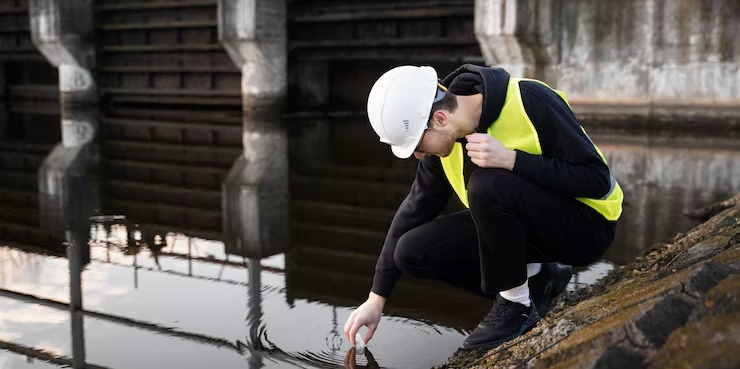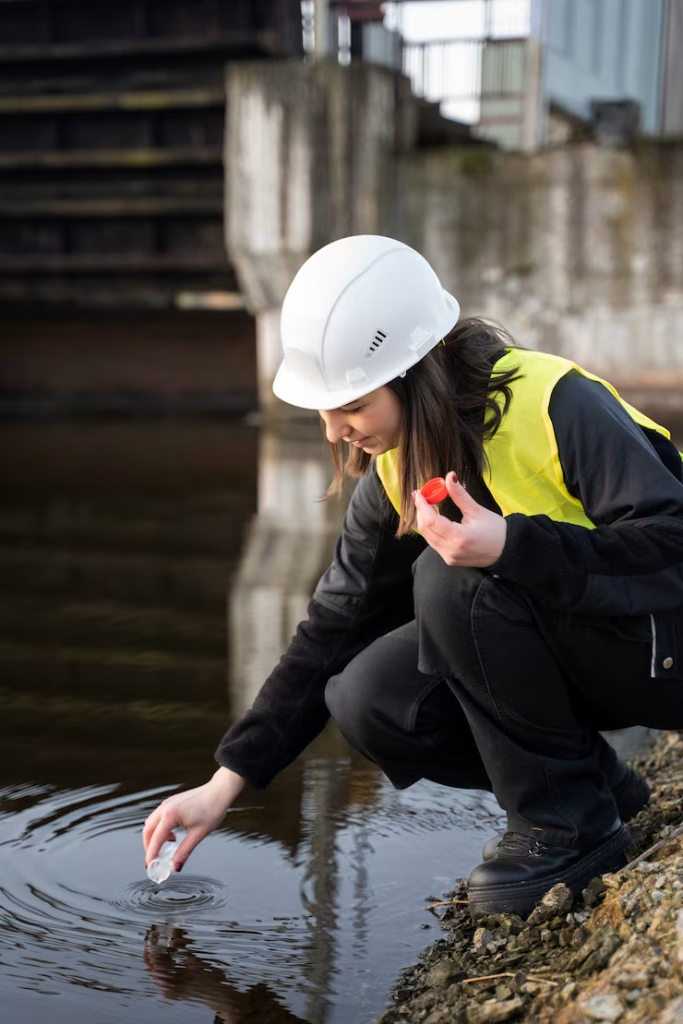
Construction Water Testing – METS Laboratories
Ensure Strength. Ensure Safety. Ensure Compliance.
At METS Laboratories, we provide comprehensive testing services for construction water — the water used in mixing concrete, curing, and other building activities. The quality of construction water directly affects the strength, durability, and longevity of civil structures. Our advanced laboratory infrastructure and expert analysis help detect impurities and ensure water suitability for construction applications as per national and international standards.
Why Construction Water Testing Is Important?
Water is a critical component in the construction process. Using contaminated or unsuitable water can cause:
• Loss of concrete strength
• Corrosion of reinforcement bars (rebars)
• Delayed setting time and poor workability
• Compromised structural integrity
• Rejection in audits and compliance checks
IS 456:2000 and IS 3025 series specify that only potable or similarly clean water should be used in construction. Regular testing mitigates risks and ensures compliance with national, international standards and client specifications.
What We Test?
We analyze the physical, chemical, and biological quality of water. Key parameters include:
• pH
• Color, Odor, Turbidity
• Total Dissolved Solids (TDS)
• Electrical Conductivity
• Chlorides
• Sulphates
• Alkalinity
• Total Hardness
• Magnesium & Calcium
• Iron & Manganese
• Oils and Grease
E. coli & Coliform Bacteria (when potable suitability is required)
IS 456:2000 | IS 3025 series | APHA | ASTM C1602
What METS Laboratories Offers?
We cater to routine construction quality control, government tenders, infrastructure audits, and third-party verifications.
What We Ensure?
Who It’s For?
Protect Consumers. Satisfy Authorities. Boost Market Confidence.
Water quality plays a pivotal role in ensuring that your structure meets its intended design life and strength. METS Laboratories empowers you to:
• Meet client expectations and legal obligations.
• Avoid structural failures and liabilities.
• Enhance your brand’s trust and technical reputation.
Our reports are accepted by government and private stakeholders across sectors.
Frequently Asked Questions
How often should construction water be tested?
Ideally, water should be tested before project start and then periodically (e.g., quarterly) during long-term projects.
Can we use borewell or river water directly for construction?
Not without testing. These sources may contain harmful salts or organic matter affecting concrete quality.
Do you offer sampling services?
Yes. Our trained staff can collect samples on-site across most regions.
What is the TAT for water test reports?
Typically 2–4 working days, depending on test scope.
Is your report valid for government projects?
Yes. Our laboratory is ISO/IEC 17025: 2017 accredited and recognized by multiple government and private authorities.
-
 Chiller Water Testing
Chiller Water Testing
-
 Dialysis Water Testing
Dialysis Water Testing
-
 Drinking Water Testing
Drinking Water Testing
-
 Waste Processed Water Testing
Waste Processed Water Testing
-
 Distilled Demineralized Water Testing
Distilled Demineralized Water Testing
-
 Ground Water Testing
Ground Water Testing
-
 Industrial Water Testing
Industrial Water Testing
-
 Irrigation Water Testing
Irrigation Water Testing
-
 Packaged Drinking Water Testing
Packaged Drinking Water Testing
-
 Packaged Natural Mineral Water Testing
Packaged Natural Mineral Water Testing
-
 Surface Water Testing
Surface Water Testing
-
 Treated Water Testing
Treated Water Testing
-
 Water For Construction Purpose Testing
Water For Construction Purpose Testing
-
 Water For Industrial Purpose Testing
Water For Industrial Purpose Testing
-
 Water For Medicinal Purposes Testing
Water For Medicinal Purposes Testing
-
 Water For Processed Food Industry Testing
Water For Processed Food Industry Testing
-
 Water For Swimming Pool And Spas Testing
Water For Swimming Pool And Spas Testing
-
 Water Testing
Water Testing





